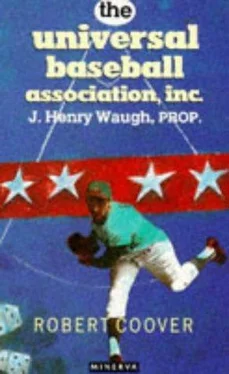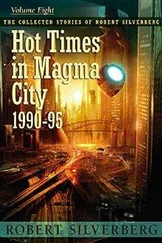Bancroft let the wrist drop. It fell away. Barney stood, turned to Gabe Burdette and Willie O'Leary. He nodded up at Brock, stricken in the stands. They understood, went up there to be with him.
The rookie catcher Chauncey O'Shea sat behind the body, mouth agape, eyes damp, and had he called..? But Casey had shaken him off. Twice.
Henry caught his breath, sank down into the chair, faced with the strange insistence of those staring ones.
Brock standing paralyzed. Alone. Knowing, but not knowing, his fists balled in silent appeal. Staring down at his son, where, from a crouch, an old friend's face looked up, told him: no.
"That's right," said McCaffree. "Funeral tomorrow." His long pale hand curved corroboratively out of black sleeve, white cuff, tips of fingers poised on the black phone's white dial. "We'll be there," the voice on the other end said softly.
Old Sycamore Flynn, manager of the Knicks, at home plate,
stood up. Glancing toward the stands, his eyes met Brock's. Was Brock looking at him, singling him out? Flynn looked away. He saw Burdette and O'Leary moving off. As though a shrinking. Henry felt it. O'Shea in tears there, and nobody coming near, but Casey — two times! And now quietly out there on the mound, he—
Brock saw them, knew why they had come. Neither Gabe nor Willie said anything. They stood by him, but gave him leave by their silence to do it his own way. Their coming helped him move at last. He took a breath, giving what life he could to his suddenly aged and borne-down body, and started forward toward the field. The two friends trailed. The sea of bodies parted and they passed through.
Henry sat again, chewing his fist, trying to keep the tears back. Couldn't stop them — Royce Ingram broke free, went for the mound, went for Casey. Yes! Casey hadn't moved, still stood by the mound, oddly aloof. Bancroft wanted to stop Ingram, but lacked the voice for it, crying himself and Flynn didn't know what to do either, it seemed out of their hands. It was clear now, yes, the rivalry, the secret grudge being nursed, the signals shaken off, Casey had wanted it, and now Ramsey and Hines were following. The Knicks stood back. Under the sun. Pupils constricted. No, wait! But then York and Patterson stepped out. Casey watched them come. He didn't seem to care. He watched them converge. Locke. Wilson. James. Wilder. " Kill him! " they cried, they all cried, and now the fans — but a hesitation… a moment… Bancroft stopped them, yes, no, he — Casey smiled! Oh the fool! Ingram hit him first. Smashed his bony face. Yes, it was a bony face with cavernous eyes and fat arrogant lips, mad, he was mad! Mad Casey staggered back. Hines threw one to the gut, doubling the killer forward. Patterson split his mouth with a crushing right, knocked him to the dirt. Henry wept, shredding paper, sobs racking him like insane laughter. James and Ramsey jumped on him, dragged the dirty bastard to his feet. Witness York — no! no! they didn' t hit him—
' No! "
The voice stopped them, had stopped them all. Didn't touch him. Ingram, his arm cocked for that first blow, heard it. He held back. They turned. Brock stood over his son's body and his quiet mournful gaze shamed them all. "No," he said again.
No. The Proprietor of the Universal Baseball Association, utterly brought down, brought utterly to grief, buried his face in the heap of papers on his kitchen table and cried for a long bad time.
HEwent out. Feeling sour. Undiscoverable sun at four o'clock in the hazy sky. But a kind of glow in the streets, mocking him. Later, he'd have it rain.
Neck and back stiff from dozing all night on the tabletop. Strange dreams there. Some high hill with ruins on it. They were playing ball up there, bunch of kids, and the ball kept disappearing over the side of the hill. He chased one, had to, thinking all the time: I'll never make it back up. There was something awful down below, but he didn't know what it was. Grabbed up the ball, but it kept slithering out of his hands. Holding it tight to his chest, climbing up with it, he discovered one leg was shorter than the other. The short one was spindly and weak and threatened to buckle under him; the long one, the left one, was thick as an elephant's leg and had to be dragged up. He was crying. They were calling him Greasy-fingers and pushing the ruins down the hill at him. Catch this, Greasyfingers! they hollered. The stones they threw had strange markings on them which they tried to read as they hurtled by.
Later they wrote on his face and rolled him up in newspapers. His tears spoiled his notebooks and a teacher pushed his face in them. The teacher looked like Zifferblatt, but had a sunburned neck like Rag Rooney. And on and on through the early morning. Not once did he dream of the dead boy.
At seven, he'd stood. Shakily. He hadn't entirely forgotten about work, it was there in the back of his mind all the time, just at seven especially, but he'd stumbled on his two odd legs directly into the bedroom, freeing himself of shirt and pants on the way, had collapsed on his rumpled bed and slept until midafternoon. Later, he'd discovered he'd torn all the buttons off his shirt.
It was a long walk to Lou's but he had a lot of time; Lou wouldn't be home until well after five. They'd all be coming, he supposed, the old and the young, all the survivors. By car, train, plane. Lot of them already in town, the old-timers anyway, because of the special ceremonies for Brock. Lot of special ceremonies for Brock. That poor old guy. Still, damn it, that's what he got for fathering more ballplayers. Rutherford couldn't be just one of the passing boys, no, he'd had to try and sanctify his own goddamn blood and name. If he'd been blessed with a name like Rag Rooney, maybe he'd have had fewer illusions. His gut ached with a surfeit of glory and history, and somehow he felt it was Brock's fault.
Well, Rooney was sorry the kid had got killed — who wasn't — but it had given him a day off, time to think, so perversely, coldly, he was grateful, too. He'd got locked in the season's pace and rituals, gone mindless in the midsummer heat, and now suddenly he'd waked up. He had to shake his boys up, shuffle the line-up, make them move, make them run, get them back into the fight. Yesterday's game with Melbourne Trench's Excelsiors had got underway before Rooney had even realized it. He'd been sure there was something he'd meant to do before, but there was the goddamn ump, hollering to get the game going, and he hadn't been able to think what it was. He'd wondered if he was getting too old maybe. Addled. His stomach had griped. He'd put one calloused hand through his flannel shirt to squeeze and soothe it, watching his Haymakers pile out onto the field.
Yes, feeling rotten. Need to eat something. Can't eat.
The Homemakers, the sportswriters were starting to call them, and Pappy's Pantywaists, Rooney's Boobies. He'd scanned the bench, trying to remember what the hell…? He'd seen Swanee Law sitting there, tensed forward, not his day to pitch, but dressed just the same, popping gum and whooping it up. A pro, all right Goddamn it, he'd be the greatest in the league if he had guys like York and Patterson to back him up. Power and control: Rag Rooney's kind of pitcher. In fact, if he had to choose between Law and the Rutherford kid, Rooney'd still take Law over the long haul. And that was what he'd been thinking about when the dugout phone rang, bringing him the news. He'd turned to Law and said: "Rutherford's dead." Why tell Law first? Rooney wasn't sure. Maybe because he'd sensed Swanee's resentment at getting beat by the kid, thought he might — but no, Law had turned white as a sheet. Rooney had called his ballplayers back in off the field to wait there in the dugout then for the official announcement before going to the showers.
Читать дальше












